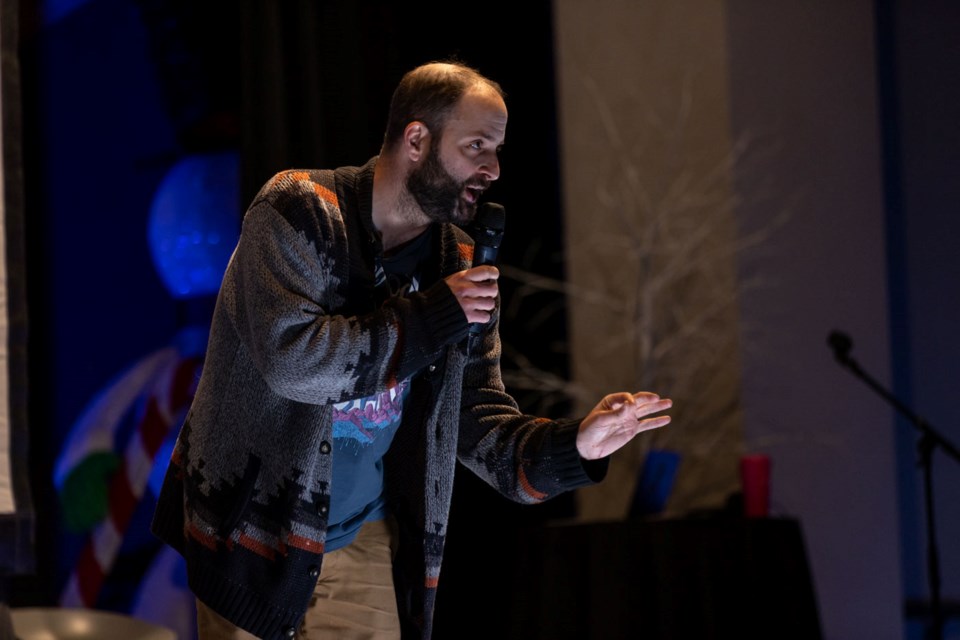A variety of studies over the years have shown that as much as three-quarters of the population fears public speaking. Officially referred to as glossophobia, it is one of the most common phobias we have as human beings, outpacing (depending on the study) the fear of enclosed spaces, heights, spiders, snakes, and even death.
A thoroughly contemporary phenomenon—I can only imagine what our cave-dwelling, game-hunting ancestors would have thought about our collective glossophobia—at the root of this unease, in my opinion, is not so much a fear of public speaking itself, but a fear of being judged and humiliated in front of our peers.
And yet, most of us have, at various times, had to make some form of oral presentation, whether a book report in grade school, a slideshow for work, or a toast at a wedding reception.
Now, imagine the added pressure of trying to make a room full of strangers laugh. For comedians, there is no better feeling in the world, and it’s partly why there’s a long history of comics chasing that energetic high with a chemical one. But when things go poorly? The sweet release of death begins to seem appealing compared to facing a hostile, or even worse, indifferent crowd.
Humour is a highly personal and subjective thing, but when your jokes don’t land, it’s hard not to take it to heart. At least when you’re making an academic or corporate presentation, there is a defined agenda underneath it all, and you can hide behind the stats and research and arguments made by those who came before you. But when you’re a stand-up, it’s just you out there, walking butt-naked on a high wire, the margin between killing it and dying about as razor-thin as you can get. Although most comedians tend to dial their personas onstage up to 11, it is, more often than not, still a reflection of their distinct personality and perspectives. If someone doesn’t like your set, there’s a high probability that person simply doesn’t like you.
I’ve been doing stand-up off and on for a few years now, and like any comic putting in the work, have had my fair share of epic bombs onstage. For a long time, this fear of failure heavily influenced my act. I would switch up my style more frequently than Celine Dion changes outfits, trying in vain to give what I thought Whistler audiences wanted. That meant a ton of dick and drug jokes, which isn’t really my style. Plus, crowds can always tell when you’re forcing it. The best comedy usually comes from a genuine place, and I’ve learned that, as a performer, you’ve got to please yourself first before some imagined audience. (Insert dick joke here.)
Bombing can also be a fruitful experience, if you let it be. Every comedian, from global megastars with HBO specials to up-and-comers hitting the open mic circuit, has stories of completely biffing it. Chris Rock talks about the time he had Martin Lawrence open for him, who did so well it was like the spectators “were in birth, like they were having babies” they were laughing so hard, proving a hard act to follow. Rock got through about 20 excruciating minutes of his hour-long set before he turned on the crowd and walked offstage. Louis CK has spoken before about audience members in Boston waiting in the parking lot to beat him up after a particularly bad set. Theo Von was once invited to a benefit show in honour of Kirk Douglas, who had just suffered a stroke. Von misheard the request to host as “roast,” and wrote his jokes accordingly. Needless to say, the spicy Kirk Douglas takedowns didn’t go over too well.
I experienced my own brutal bomb recently doing an open mic at RMU in the Upper Village, the first time in a long time I’ve shown my ass like that. Whistler crowds (at least unpaid ones) can sometimes be a tough nut to crack, and following a music open mic, many of the attendees to RMU on an average Wednesday aren’t necessarily there for the ha has, but rather to catch some tunes and knock back a few bevvies. So, there I am, trying to work out some new material, mostly to crickets, when a pair of pals start gabbing away at full volume in the back. Normally, this wouldn’t bother me, but already feeling the awkwardness of a dead crowd, combined with the pressure I was feeling to hone my fresh material for a paid gig that was just two days away, and instead of handling hecklers with a dose of levity like I usually try to do, I sorta snapped.
“Hey neckbeard!” is a good way to get someone’s attention, but probably not the most efficient way to bring a boisterous audience member over to your side.
The loud conversation continued, and I kept poking the bear, interrupting what was already a set that had veered wildly off-track, until the point I was so frustrated, I simply walked offstage mid-set, something I’ve never done before.
It was, to put it mildly, a humbling experience, and one that came with an important reminder: no matter how confident or experienced you are as a performer, there are always going to be those nights where everything goes sideways, despite your best intentions. And you can either let those epic bombs burn you up or you can learn from the scars. The best comics do the latter, because they know sometimes you gotta become a punchline to write one.




